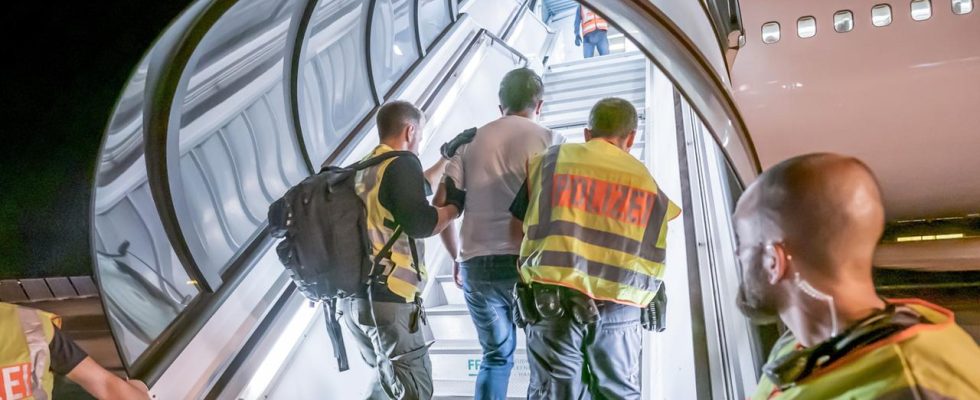The cabinet has approved a bill to speed up the deportation of rejected asylum seekers. The police should be given more powers and detention on departure should be extended. Criticism also comes from within our own ranks.
The traffic light government wants to deport rejected asylum seekers without a right of residence more quickly. According to government sources, the Federal Cabinet has approved a corresponding package of measures presented by Interior Minister Nancy Faeser. Among other things, this provides for the maximum duration of so-called exit custody to be extended from the current ten to 28 days. This is intended to prevent deportees from going into hiding before being repatriated.
The police and authorities should be given more enforcement rights in the deportation process. For example, in shared accommodation, they should also be allowed to search for people who are obliged to leave the country in the rooms of roommates. In addition, deportations of previously tolerated people should no longer be announced in advance, except for families with children under the age of twelve. Tougher action should also be taken against smugglers. The law is now being discussed in the Bundestag.
Faster Job opportunities for refugees
Both Chancellor Olaf Scholz and Faeser had emphasized that deportations had to be accelerated. The measures are part of a migration package that was agreed upon within the traffic light coalition. It also includes opportunities for refugees to work more quickly.
In the first half of this year, 279,098 people who were required to leave the country lived in Germany. At the end of September, according to the Federal Ministry of the Interior, there were 255,000. Of these, around 205,000 had a tolerated stay and cannot currently be deported. According to the ministry, there were around 12,000 deportations this year by the end of September.
Isolated criticism from the traffic lights
The countries responsible for deportations and the opposition complain that returns are only possible if the countries of origin also accept that people are taken back. However, this is often not the case. That’s why the federal government’s special representative, Joachim Stamp, has been negotiating such agreements for months.
There is also occasional criticism of the tightening of the law in the SPD and Green factions. The migration expert of the Green parliamentary group, Filiz Polat, sees “disproportionate interference with the fundamental rights to freedom, inviolability of the home and the privacy of those affected.” These interventions met with unanimous rejection from churches, charities and civil society organizations. “We will accordingly address the constitutional and European law concerns in the parliamentary deliberations,” said Polat.
Sharp criticism from the Green Youth
The Green Youth also criticizes interference with fundamental rights. “This deportation package must not happen like this. It is partly unconstitutional and completely inhumane,” said the new co-head of the Green youth organization, Katharina Stolla, to the dpa news agency. “The planned regulations will lead to deportations becoming even more traumatizing. It is wrong that this law was negotiated and passed in this way in the cabinet – even with Green approval,” explained Stolla.
The situation for refugees is threatening, violence on the run and also here in Germany is a brutal reality, said Stolla. Solutions are needed that help people: making it easier for family reunification, medical care for people without papers, and opening up integration courses. This is also provided for in the coalition agreement. “Instead of protecting refugees and relieving the burden on municipalities, the traffic light is moving to the right. What is needed now is a policy that protects human rights and creates social security,” said Stolla.
Not enough for the Union
For the CDU, the plans do not go far enough. CDU General Secretary Carsten Linnemann criticized that 1,000 illegal immigrants come to Germany every day, but only 1,000 are deported every month ARD morning magazine. “The ratio is not right at all.” We therefore have to react now.
The CDU politician called for “a major migration pact”. For Linnemann, this includes, among other things, stricter border controls, designating additional countries as safe countries of origin and switching from cash to benefits in kind for refugees. The “vision” must be that only people who have a positive asylum decision come to Germany.
Faeser defends measures
Faeser defended himself against the criticism. The adopted “bundle of restrictive measures” is necessary to “significantly limit” irregular migration to Germany, she said. She also rejected the fact that the Greens as a whole had concerns about their plan. There can be no question of that, after all, their draft law was passed by the entire cabinet. “The Greens are sitting at the table.” This is “a good signal” for the federal government’s ability to work.
CDU leader Friedrich Merz had previously asked Chancellor Scholz to participate in migration policy in a letter. It is “an important concern” to him that the government, states and opposition “come to agreements together in order to noticeably reduce irregular migration to Germany,” he explained in the letter.
Scholz and the state leaders want to discuss the issue of migration at the Prime Minister’s Conference (MPK) on November 6th. The country leaders had already spoken out in advance, among other things, in favor of a payment card for refugees and faster and more consistent repatriation of rejected asylum seekers.

